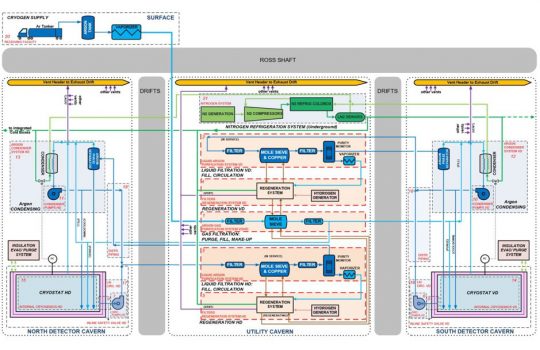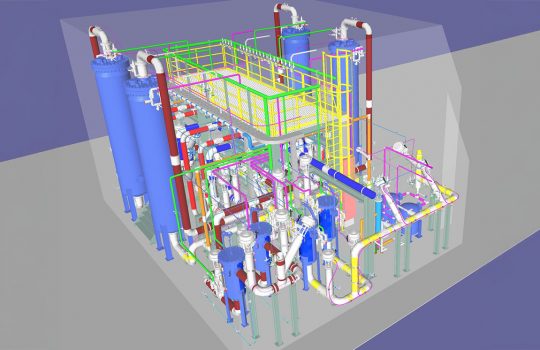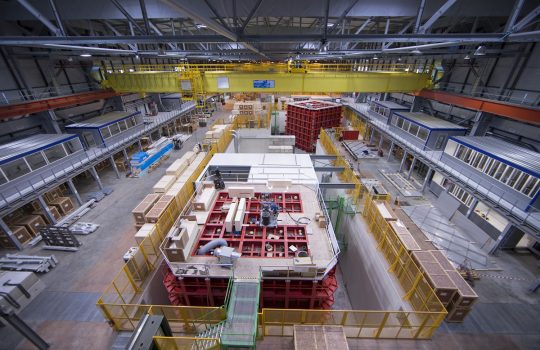
Jo Johnson learns about accelerator technologies at Fermilab. From left: Fermilab Chief Strategic Partnerships Officer Alison Markovitz; Fermilab scientist Anna Grassellino; Andrew Price of the UK Science and Innovation Network; DUNE co-spokesperson Mark Thomson; STFC Chief Executive Brian Bowsher; UK Minister of State for Universities, Science, Research and Innovation Jo Johnson. Photo: Reidar Hahn
UK minister Jo Johnson traveled to the United States this week to sign the first ever umbrella science and technology agreement between the two nations and to announce approximately $88 million in funding for the international Long-Baseline Neutrino Facility and Deep Underground Neutrino Experiment.
On Thursday, he visited the host laboratory for LBNF/DUNE, the U.S. Department of Energy’s Fermi National Accelerator Laboratory, emphasizing the importance of the project and the strong scientific partnership between the two countries.
Johnson, the UK minister of state for universities, science, research and innovation, signed the agreement on Wednesday in Washington, D.C. Signing for the United States was Judith G. Garber, acting assistant secretary of state for oceans and international environmental and scientific affairs.
This new agreement lays the groundwork for additional collaboration between the U.S. DOE, its national laboratories (including Fermilab) and the UK Science and Technology Facilities Council. STFC funds research in particle physics, nuclear physics, space science and astronomy in the United Kingdom. The U.S. DOE is the largest supporter of basic research in the physical sciences in the United States.
“Our continued collaboration with the U.S. on science and innovation benefits both nations,” said Johnson, “and this agreement will enable us to share our expertise to enhance our understanding of many important topics that have the potential to be world changing.”
LBNF/DUNE will be a world-leading international neutrino experiment based in the United States. Fermilab’s powerful particle accelerators will create the world’s most intense beam of neutrinos and send it 800 miles through Earth to massive particle detectors, which will be built a mile underground at the Sanford Underground Research Facility in South Dakota.
The UK research community is already a major contributor to the DUNE collaboration, providing expertise and components to the facility and the experiment. UK contributions range from the high-power neutrino production target to the data acquisition systems to the software that reconstructs particle interactions into visible 3-D readouts.
DUNE will be the first large-scale experiment hosted in the United States that runs as a truly international project, with more than 1,000 scientists and engineers from 31 countries building and operating the facility. Its goal is to learn more about ghostly particles called neutrinos, which may provide insight into why we live in a matter-dominated universe that survived the Big Bang.

The UK delegation visits the Fermilab underground neutrino experimental area. UK Minister Jo Johnson stands in the center. Immediately to his left is Fermilab Director Nigel Lockyer. Photo: Reidar Hahn
In addition to Johnson, the UK delegation to Fermilab included Brian Bowsher, chief executive of STFC; Andrew Price of the UK Science and Innovation Network; and Martin Whalley, deputy consul general from the Great Britain Consulate in Chicago.
They toured several areas of the lab, including the underground cavern that houses the NOvA neutrino detector, and the Cryomodule Test Facility, where components of the accelerator that will power DUNE are being tested. The UK will contribute world-leading expertise in particle accelerators to the upgrade of Fermilab’s neutrino beam and accelerator complex.
“This investment is part of a long history of UK research collaboration with the U.S.,” said Bowsher. “International partnerships are the key to building these world-leading experiments, and I am looking forward to seeing our scientists work with our colleagues in the U.S. in developing this experiment and the exciting science that will happen as a result.”
UK institutions have been a vital part of Fermilab’s 50-year history, from the earliest days of the laboratory. UK labs and universities were important partners in the main Tevatron experiments, CDF and DZero, in the 1980s and 1990s. UK institutions have been involved with accelerator research and development, are partners in Fermilab’s muon experiments and are at the forefront of Fermilab’s focus on neutrino physics.
Sixteen UK institutions (14 universities and two STFC-funded labs) are contributors to the DUNE collaboration, the U.S.-hosted centerpiece for a world-class neutrino experiment. The collaboration is led by Mark Thomson, professor of experimental particle physics at the University of Cambridge, and Ed Blucher, professor and chair of the Department of Physics at the University of Chicago.
“Our colleagues in the United Kingdom have been critical partners for Fermilab, for LBNF/DUNE and for the advancement of particle physics around the world,” said Fermilab Director Nigel Lockyer. “We look forward to the discoveries that these projects will bring.”
Fermilab is America’s premier national laboratory for particle physics and accelerator research. A U.S. Department of Energy Office of Science laboratory, Fermilab is located near Chicago, Illinois, and operated under contract by the Fermi Research Alliance LLC, a joint partnership between the University of Chicago and the Universities Research Association, Inc. Visit Fermilab’s website at www.fnal.gov and follow us on Twitter at @Fermilab.
The DOE Office of Science is the single largest supporter of basic research in the physical sciences in the United States and is working to address some of the most pressing challenges of our time. For more information, please visit science.energy.gov.



